|
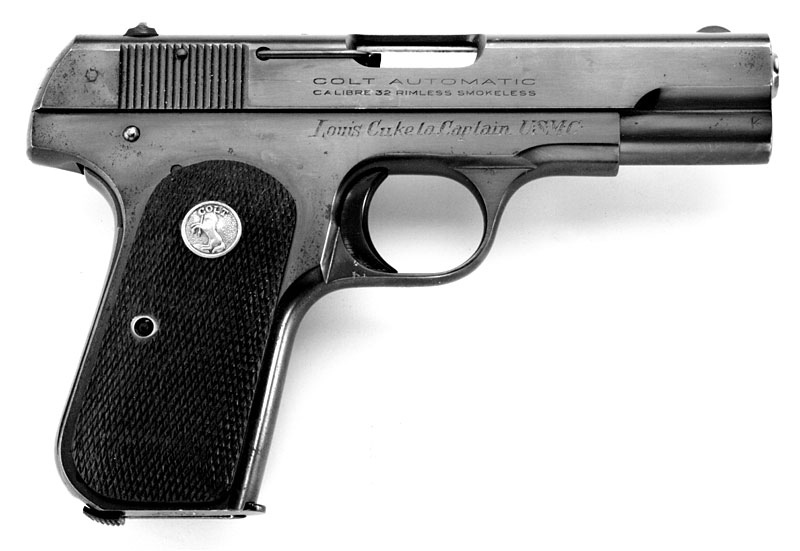
Private Collection
Colt Model 1903 Pocket Hammerless .32 ACP factory
inscribed - serial number 522524, factory
inscribed "Louis Cukela, Captain USMC" with factory
checkered walnut stocks with flush medallions, a one gun
shipment to Capt. Louis Cukela, USMC, Norfolk, Virginia on
January 9, 1937, processed on Colt factory order number
17414/1.

Colt Model 1903 Pocket Hammerless .32 ACP factory
inscribed - close-up of inscription on right side to two time Medal of
Honor recipient Louis Cukela, Captain USMC.
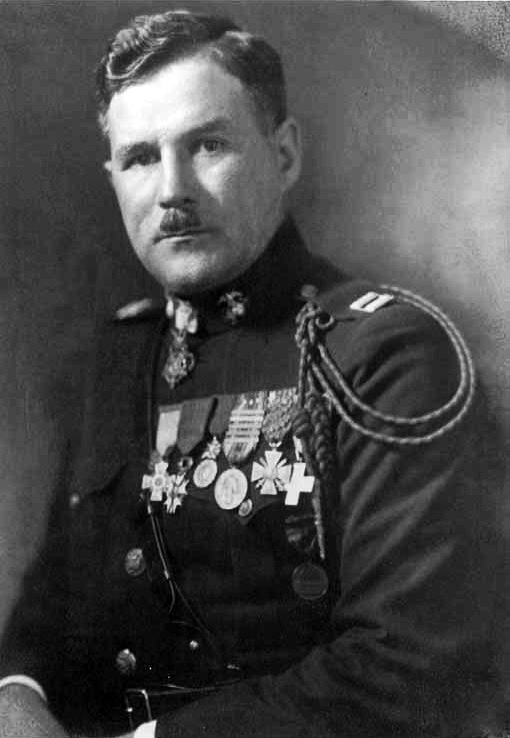
Louis Cukela (May 1, 1888 – March 19, 1956) was a
Croatian-born United States Marine numbered among the
nineteen two-time recipients of the Medal of Honor. Cukela
was awarded the Medal by both the US Army and the US Navy
for the same action during the Battle of Soissons in World
War I. He was also awarded decorations from France, Italy,
and Kingdom of Yugoslavia.
[Source:
https://en.wikipedia.org/wiki/Louis_Cukela]
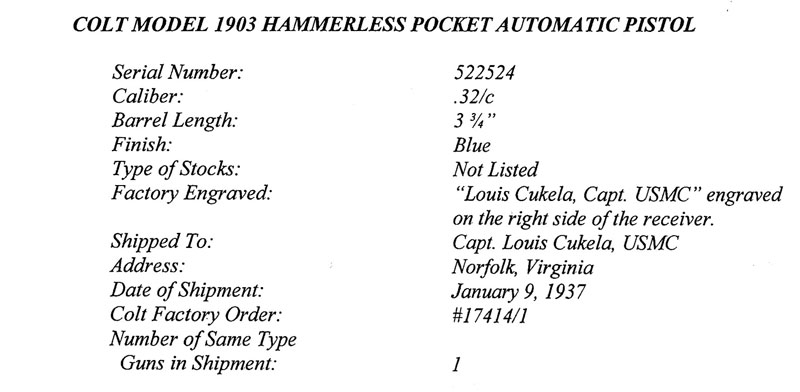
Colt Model 1903 Pocket Hammerless .32 ACP
factory inscribed - factory letter.
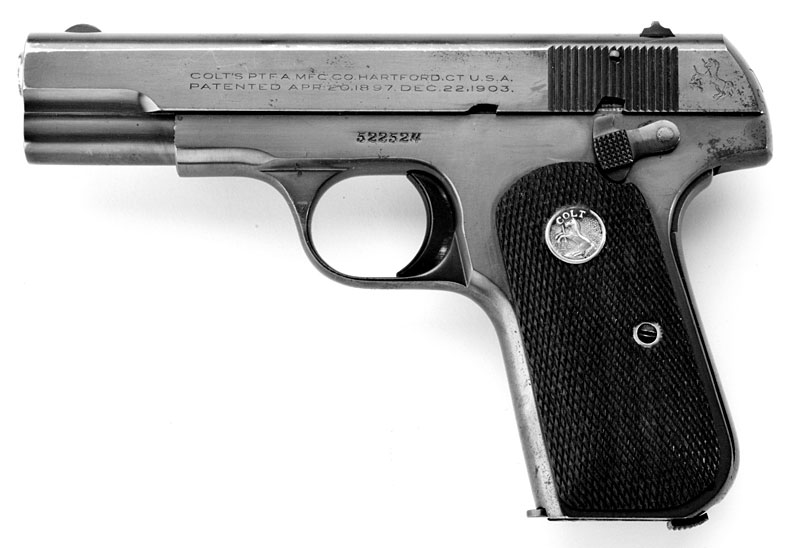
Colt Model 1903 Pocket Hammerless .32 ACP
- serial
number 522524, left side.
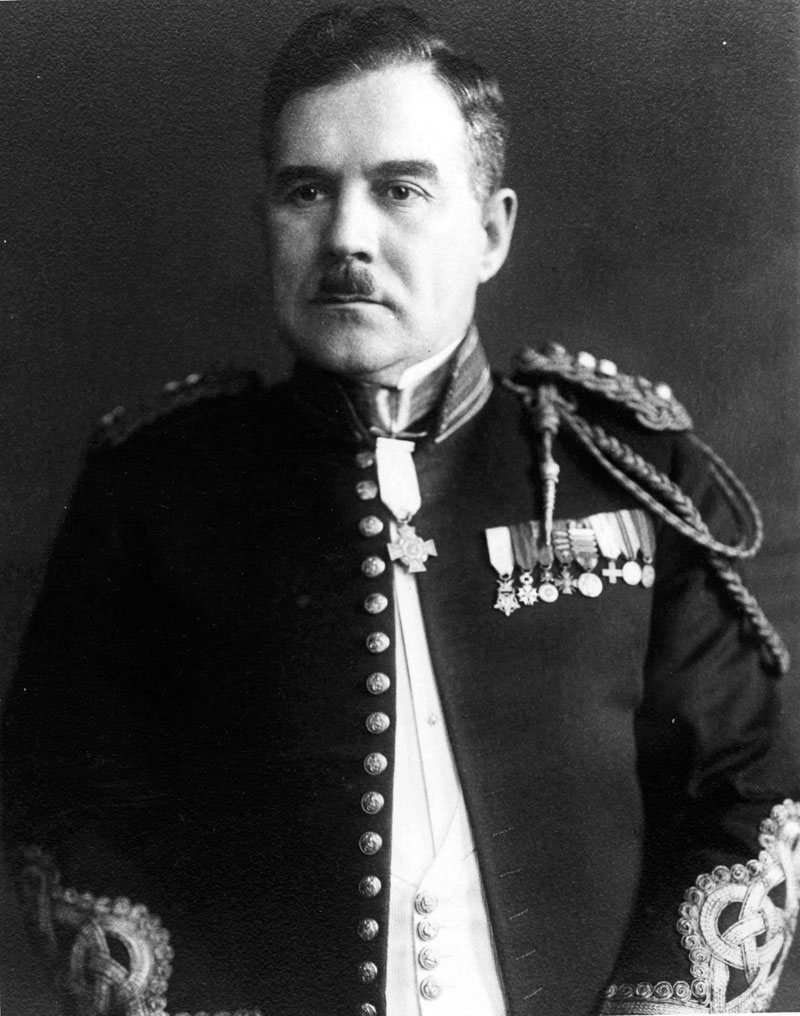
Captain Louis Cukela, USMC Published
in Leatherneck Magazine, October 2006 by Maj
Allan C. Bevilacqua, USMC (Ret)
Jun 16, 2011 Do you have a dictionary handy?
You do? Good. Pull it down from the shelf and look up the
word eccentric. Don't be surprised if you find a photograph
of Louis Cukela right alongside.
Cukela [pronounced coo-KAY-la] was the living embodiment of
the word, the prime meridian from which any and all things
eccentric are measured, a man who could leave observers
shaking their heads in bewilderment at the same time they
were doubled over in laughter. If there ever was a man who
did things his way, even if that way might have seemed odd,
a man blunt as a bullet and direct as an avalanche, that man
was Louis Cukela. And he always ... always ... had the last
word.
Wait a minute, wait a minute. Who was this Cukela character,
some kind of nut? OK, let's back up and start from the
beginning. Louis Cukela was born in the town of Spalato,
known today as Split, in Croatia in 1888. Maybe that was a
hint of things to come, because Croatia, along with Serbia,
Slovenia and Bosnia, all those feuding, fussing and fighting
places known as the Balkans, was part of what was then known
as Austria-Hungary. That was where in 1914 everything boiled
over and erupted into the First World War, which didn't mean
all that much to Louis Cukela.
He packed up and went to America in 1913. There was a tour
as a cavalry trooper in the U.S. Army that ended in 1916,
but Cukela didn't stay a civilian for long. In January 1917,
just a few months before the United States entered World War
I, he enlisted in the Marine Corps, and in time, found
himself a member of the 66th Company, 1st Battalion, Fifth
Marine Regiment.
In France in 1918, Cukela fought in every battle of the
Marine Brigade, from Belleau Wood to the Meuse River
Crossing. Along the way he collected a commission as a
second lieutenant, as well as the Medal of Honor and four
Silver Star Citations. From the French, there was the Legion
d'Honneur, the Medaille Militaire (the first award of this
prestigious decoration to a Marine officer) and the Croix de
Guerre 1914-18 with two palms and one Silver Star. Italy
decorated him with the Croce al Merito di Guerra, while
Yugoslavia weighed in with the Commander's Cross of the
Royal Order of the Crown of Yugoslavia.
The only award for mangling the English language was
unofficial. Cukela won that hands down when he tore a
careless subordinate a new one, ending with the line that
became famous: "Next time I send damn fool I go myself."
Next time I send damn fool I go myself. Those nine words
swept through General John J. Pershing's American
Expeditionary Forces like Epsom salts through a goose. YANK,
the AEF newspaper, drew a series of cartoons around them.
They found their way into Stateside magazines. The humbler
in the ranks could expect to hear them from his squad
leader. It was rumored that GEN Pershing himself resorted to
them when his patience was sorely tried. And they
established Louis Cukela as a world-class eccentric.
Next time I send damn fool I go myself. Try them yourself
the next time some goof-off fouls things up. see how good it
feels. Kind of takes the strain off the liver.
For Louis Cukela, though, that was just the start. There
were always new challenges, and there were always inventive
ways of overcoming them. And always there was the last word.
Take the case of the School Solution. That was in the 1930s
when Cukela, then a captain, attended the Army's Infantry
School at Fort Benning, Ga. At the finish of one particular
practical application problem in infantry tactics, Cukela
was called upon to present his solution to the situation.
"I attack," was Cukela's response.
That, according to the instructor, was not the proper course
of action given the situation. Examining all the aspects of
the situation in detail, the instructor went on to explain
that the proper course of action, the School Solution, was
to withdraw to more defensible terrain and establish a hasty
defense.
"I am Cukela. I attack," Cukela retorted. Then, tapping the
ribbon of the Medal of Honor above his left breast pocket,
he fired the last word. "How you think I get this?"
Fort Benning may have been the Army's school for infantry
officers, but that didn't rule out the school including
classes in equestrianism-horseback riding. Officers on
horseback were a leftover from the Army's days of chasing
Geronimo across Arizona, but every officer student at Fort
Benning put in a certain amount of hours on top of a horse.
It took Louis Cukela to come up with a unique method of
getting a horse's attention.
Riding a horse might have seemed like duck soup for an old
cavalry trooper. The truth was, though, Cukela didn't like
horses, didn't like them the least little bit. On the other
hand, if the antics of one particular horse can be taken to
mean anything, horses didn't care all that much for Cukela
either.
Anyone watching might have suspected that fact on the day
Cukela's mount took off on him at a gallop. Despite every
command of bridle and bit, the horse lit out for the horizon
with Cukela bouncing up and down in the saddle like a rubber
ball on top of a water fountain. None of the methods that
had been taught persuaded the horse to even slow down, much
less stop. The horse was headed for the Chattahoochee River
and Alabama.
Tossing aside the accepted means of controlling a horse,
Cukela sawed on the reins and shouted, "Stop, horse!" The
horse kept right on going.
"STOP, HORSE!" Louder this time. No response from the horse
except to gallop faster.
"STOP, HORSE!" People in downtown Columbus stopped and
listened, wondering what all the commotion was. The horse
shifted into a higher gear.
Enough was enough. Cukela balled up his fist and slammed it
down squarely on top of the horse's head. The horse
staggered and stumbled to a halt, tossing its head and
staring about with out-of-focus eyes.
Cukela leaped from the saddle, snatched the bridle and
yanked the horse's head down to eye level. "You listen good,
horse," he growled. "I am Cukela. You are horse. I tell you
stop, you stop. You not stop I give you hit break your
head." Cukela turned on his heel and stalked off, leaving
the stunned horse shaking its head. "Stupid horse," Cukela
muttered.
Blunt as a bullet. Direct as an avalanche.
That may have been what the company commander in San Diego
thought when Cukela appeared as a member of the Adjutant and
Inspector's official party. The Adjutant and Inspector was
the forerunner of today's Inspector General. Then as now,
the Adjutant and Inspector represented the Commandant of the
Marine Corps, and Marine Corps commands could expect to
stand A&I Inspections on a regular basis.
That was what was taking place when Capt Cukela found a
number of glaring irregularities in certain records, records
not maintained in the manner stipulated by the Marine Corps
Manual. Asking for the company's copy of the Marine Corps
Manual, Cukela thumbed through it to the appropriate
passages.
Then, ripping out the particular pages, Cukela handed them
to the company commander. "Here, you not needing these pages
anymore. You have better way, hah?"
Have you ever, when you were firing the rifle range, been
ordered to fix bayonets and charge? You might have if you
had been a recruit at Parris Island in the late 1930s. That
was when, during a particularly bad string of rapid fire,
the range officer, Capt Cukela, snatched the microphone from
his line noncommissioned officer.
"Cease fire. Clear and lock your piece. Fix bayonets. Charge
the butts!" Cukela bellowed. Fifty bewildered recruits went
galumphing downrange with fixed bayonets while Cukela urged
them on. "You can't shoot them; you go stab them."
The Golden Age of Cukela had to have been at Norfolk, Va.
Retired just prior to the outbreak of WW II, then-Major
Cukela was almost immediately recalled to active duty and
assigned as Commanding Officer, Marine Barracks, Norfolk
Naval Base. Long years after he left, Marines at Norfolk
were still telling Cukela stories.
One particular story that lived on grew out of Cukela's
penchant for leadership by walking around. He didn't believe
in leading from behind a desk; he believed in getting out
and seeing first-hand what was going on every day. Not a bad
style, come to think of it.
It happened that as Cukela was ascending the ladder to the
second deck of the barracks, two young Marines, new hands,
were coming down. As they had been taught in boot camp, they
stood aside at attention, allowing the major to pass.
Instead, he stopped.
Skewering one of the Marines with a piercing gaze, he asked,
"You know who I am?"
"No, sir," replied the puzzled Marine.
"Hmph," snorted Cukela. "Dumb. Don't know nothing."
Turning to the other Marine, Cukela asked the same question.
"You know who I am?"
"Yes, sir," the Marine responded smartly. "You're Major
Cukela."
"Hmph." Another snort. "Wise guy. Think you know
everything." That last word again.
As to getting out and about, well, Cukela did that by
bicycle. There was a war on. A lot of things were in short
supply. There was rationing, and not the least of the
commodities rationed was gasoline. As a means of conserving
fuel, Cukela got about the base on a bicycle, a conveyance
not without its perils.
Do you remember the old taunt when you were a kid playing
sandlot baseball and muffed an easy ground ball: "Two hands
for beginners"? Riding a bicycle was strictly a two-hands
job for Cukela. Any attempt to guide a bicycle with only one
hand was a surefire preliminary to Cukela and the bicycle
both ending up in a heap.
As a result, there was a standing instruction that Maj
Cukela was not to be saluted when he was on a bicycle. That
was, of course, a challenge no Marine could resist. Marines
were known to go out of their way to search out Cukela when
he was mounted on his bicycle. Then it was a matter of
rendering the proper courtesy, a hand salute.
For any officer, and for Cukela in particular, a salute was
a courtesy that was to be returned. He never failed to do
so. He never failed either, to go tumbling rump over
teakettle to land in a heap, much to the secret delight of
the Marine who had brought the whole mishap about. But it
was Cukela as usual who always had the last word.
"How many times I got to tell you, don't salute when I'm on
the bicycle?"
Louis Cukela, a real funny guy. But a mighty warrior and
stand-up guy who always looked out for his Marines, and who
could always be counted on to be there when a Marine needed
a helping hand. [Source:
https://www.mca-marines.org/mcaf-blog/2011/06/16/next-time-i-send-damn-fool-i-go-myself] |